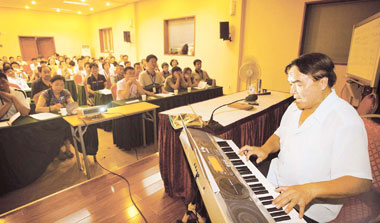Internet addiction is becoming a problem in industrialized countries and treatment is hotly debated. There are military-type boot camps, clinics, acupuncture, psychotherapy and now a residential program in the United States. Yao Minji logs on.
David Tang angered and confused his parents when he suddenly slapped his father after he turned off the eighth grader's computer. Tang, 14, had been online - mostly playing a popular virtual community game - for more than 20 hours. That, however, wasn't his online time record.
 |
|
Professor Tao Hongkai (right), an expert on Internet addiction treatment, performs at a summer camp for Internet addicts in Beijing. [CFP]
|
His father, declining to give his first name, is worried that his son will become an Internet addict, with what is now called Internet Addiction Disorder.
The 42-year-old businessman asked his son many times to turn off the computer and get some rest - his son just ignored him.
"I was so shocked. My son is a nice kid with proper manners. I don't understand how he suddenly became like this. At that second, his immediate reaction was to beat me," says the father.
He feels a little better now that his son made apologies, sort of, but not directly. He told his parents he hadn't intended to strike his father.
"I was at a crucial moment in the game and the screen suddenly turned black," the son recalls. "I guess I just lost control and considered my dad my enemy from the game for that instant."
Internet addiction, though definitions vary, is considered a serious problem in China. There are no reliable estimates but media commonly report four to 13 million people spending six hours or more online. That doesn't sound like much.
Tang's parents want to seek assistance for his compulsive behavior, however, they worry about what's effective and what's credible.
Disturbing news reports have surfaced recently about harsh treatment of young addicts, including electroshock therapy (now banned) and beatings.
In August, a 15-year-old student from Guangxi Zhuang Autonomous Region was reportedly beaten to death by trainers in a military-style summer boot camp specializing in Internet addicts. Similar cases of abuse have since been uncovered, both before and after the boy's death.
In July, the Ministry of Health banned/suspended the use of electroshock therapy to treat Internet addiction, notably in Linyi Mental Health Hospital in Shandong Province.
The head of the hospital, psychiatrist Yang Yongxin, was considered a pioneer and hero in Internet addiction treatment. Even after the ban, he has been swamped by desperate parents seeking help for their children. He was known for using xing nao or "brain waking" electric shocks, some leaving painful burns. He is still doing big business using milder electrical therapies.
Many parents regard Internet addiction as bad behavior or a discipline problem to be corrected - not something symptomatic of underlying teen problems like anxiety, stress, depression, difficulty socializing and so on.
These underlying issues could mean the parents themselves play an unconscious role in their children's problems, a hard pill to swallow. Some young people obsessed with the Internet have said they want to escape excruciating pressure at home and in school to excel academically.
Tang's parents spoke with friends whose children have the same addiction - spending so much time online that school and family suffer - and decided not to do anything drastic at this time.
They decided to spend more time with their son.
That is one approach recommended by many experts such as Dr Du Yasong from the Shanghai Mental Health Center and a member of the Chinese Mental Health Association's branch for children and teenagers.
"Internet addiction often hits students with poor communication skills, those with no hobbies apart from study or those eager to show off their skills in Internet games," says Du. Some who don't perform well in "real" life are heroes in cyberspace games.
He recommends comprehensive treatment involving parents and teachers.
The Shanghai Mental Health Center mostly uses psychological counseling and medication (usually anti-depressants and sedatives). It gives lectures to both students and teachers about addiction and proper Internet use.
A 2007 Web addiction survey by the China Youth Internet Association reported that almost 10 percent of young people are Web addicts. The survey covered 12 cities, including Shanghai, Beijing, Chengdu and other major cities.
It defines Web addiction in this way: "Web use brings bad influences in study, work or communications in the real world. At least one of the following applies: The person feels happier or more satisfied online than in reality; gets upset, depressed or confused when forced to be off line; hides the time online from family."
More than half the respondents said they stayed online to chat or make friends. More than 20 percent said they had poor relations with teachers, family and classmates.
Experts also say that parents - often shocked and worried when they suddenly realize their child is addicted - either overreact or do little or nothing, some are in denial.
Some parents send normal kids who use the Internet a lot to treatment institutions or military-type camps.